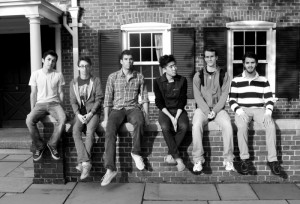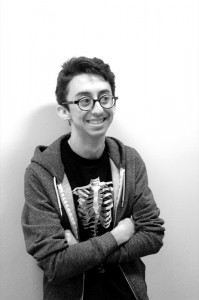He is outstandingly handsome and robust, very masculine.
This is The American Heritage Dictionary’s example sentence for the word “masculine.” It’s the kind of sentence that’s intended to elucidate, to enlighten. It’s the kind your high school English teacher makes you write on tests to prove, beyond a shadow of a doubt, that you know the meaning of the word. Masculine equals handsome plus robust. Outstandingly so.

Does America really define masculinity this way? Does Yale?
Every Wednesday afternoon, in a well-lit basement classroom in Rosencrantz Hall, twenty Yalies and a professor, Graeme Reid, attempt to answer these questions and more. The course, offered by the Women’s, Gender, and Sexuality Studies Department, is “Men, Manhood, and Masculinity.” The thirteen women and seven men enrolled were chosen from some one hundred applicants.
They have their work cut out for them. A national conversation has emerged, one that suggests masculinity is in crisis. This summer, The Atlantic Monthly ran a cover story called “The End of Men,” citing the new female majority in the workforce as a defining shift. In October, Newsweek featured a piece called “MAN UP! The Traditional Male is an Endangered Species. It’s Time to Rethink Masculinity.” And now, Yale is offering a course on what it means to be a man.
***
Max Saltarelli ’13 saw the course description and thought, “Men, manhood, masculinity? That sounds really cool! I’m a male! So maybe I would know a thing or two about men!”

His interest in the course is personal. Saltarelli came out as gay about a month into his freshman year. His parents, he says, are each from different generations (his father is older) and they had different ideas about raising a son. His mother was “loving and sheltering,” indulging his whims—like when he just had to have that pair of jelly shoes in preschool, or when he wanted to be the Pink Power Ranger for Halloween.
His father “envisioned it in a more ‘50s sort of way” than his mother. He wanted his son to go fishing, or throw a football around, or “get really into basketball.” Laughing, Saltarelli tells me that he didn’t quite fit the mold. His childhood was marked by a series of botched attempts at Little League. Then there was “a brief basketball thing. Literally one practice.” Max puts on a gruff voice to imitate his father: “He should be outside playing football!” The imitation is lighthearted, but he does remember feeling “kind of sad.” Did his mother care that he didn’t play sports? “Not at all.”
Unlike some of his classmates, Saltarelli wants to be there not because he has thought so much about the issues the course addresses—but rather he feels he hasn’t thought about them enough. In any case, he “semi-took it on a whim.”
For his part, John Yi ’12 wanted to take something different. He had taken 24 credits in his first two years, all in the Math, Economics, and Music Departments. When he saw “Men, Manhood, and Masculinity” in the Blue Book, he thought, “Those are the same questions that I think about every day.”
Yi lights up when he talks about his three sisters—one’s his twin, two are a couple of years older. They “happen to be the most beautiful, talented, amazing, empowering women” he knows. (“One of them went to Wellesley—she like, wanted to go to Wellesley.”) Growing up, John and his sisters were inseparable. They took gymnastics and dance classes together—he even joined them at the salon for haircuts. They were best friends. He says he never realized that “there really is a power dynamic between boys and girls” in much of society. His mother owned a small business; she was the breadwinner and head of the household. “It was always ‘Mama Yi and her four kids,’” he chuckles. When Yi came to Yale, the combination of living with men for the first time and coming out as gay made him ask, “Holy shit, what is masculinity? What does it mean to be a guy?”

As the students of WGSS 304 have discovered, the answer varies from place to place and across communities. Harry VanDusen ’14 is from Lynnfield, Massachusetts, a small town settled in 1638. He describes the idea of masculinity there as “traditional.” Back home, a man was expected to be “tough, a tough guy”—stoic, physically and emotionally. When I ask if there were any openly gay men in his community, he rocks forward and almost spits out his drink. “Oh God no. Oh no. That was not good. It was very traditional in that way, like that’s not acceptable. It’s predominantly white, Catholic, Italian. I’m none of those things.” He pauses. “Well, I’m white.”
VanDusen is straight, but he’s into the arts and musical theater, which made him unusual in Lynnfield. “It was like, ‘you should be playing a sport.’” But VanDusen didn’t feel the need to conform—“I am what I am”—and, with the support of his parents (he calls his mother “strong” and his father “chivalrous”) he did what he wanted, and gave it his all. Now he performs, swims, and wants to be a doctor. VanDusen, who didn’t conform to his town’s masculine ideal, wanted to learn how other communities interpreted the concept of masculinity.
Like VanDusen, Emmanuel Ramirez ’12 says he didn’t feel parental pressure to become any specific type of boy. He grew up as an only child living with his mother and grandmother, who always encouraged him to be who he wanted to be “without really any expectations for what that was.” Today Ramirez, who is gay, finds that “femininity, or the idea of what it is to be feminine, is definitely more available for me—just because it’s all I’ve been around, for the most part.”
For the most part. Ramirez went to an all-boys Catholic school in Chicago. Though he’s not religious now, he and his high school friends did go through a “spiritual” phase where “religion and being a good person were just really important, and what we were about.” Still, he had always noticed that “[Catholicism] revolves around men being in power.” Unlike his Yale friends, Ramirez’s high school friends were mostly athletes. And at his parochial school, there was a general compulsion: to “act hard and tough.”
That compulsion is everywhere in the virtual world of Halo, the online shoot-em-up game that is a favorite of George Norberg ’11. About 98 percent of Halo players, Norberg reports, are men aged 16 to 25. There may be some “chill” guys to become friends with—two of his online friends just started a business together—but there’s a lot of testosterone. “If you win,” he writes in an e-mail, “you feel like you’ve proven your masculinity. If you lose, you feel like you aren’t good enough.” If you kill an enemy, there’s a sexualized “tea-bagging” custom in which you “crouch on [the corpse] repeatedly.” A lot of the players, he adds, call each other “gay” or “fag.” Norberg, who is straight, sees this belittling as an attempt to affirm their own masculinity.
In addition to video games, Norberg likes public health and sex. He is on the Board of Directors of Sex Week at Yale. He also has a radio show on WYBC called “Sex Talk,” the purpose of which is self-explanatory. But because there’s no such thing as too much sex talk, Norberg signed up for this class, too.
For Jake Conway ’11, the class also provides talk—but talk will only get him so far: “The class isn’t going to answer my internal struggle.” It’s not a course that “teaches you how to live or be a man.” Jake is the founder of “Q,” a magazine slated to launch next month that will explore LGBTQ-related issues, and he answers my questions like he’s said it all before. “As a gay male,” he says, “you come up against a tension between your sexual identity and your gender on a daily basis. It’s something that’s inevitable because of the historic association between gay men and effeminacy.” Jake is far from effeminate. He has a more forceful presence on the phone than most people have in person. He’s big and tall, he works out a lot, and he played sports in high school. At gay bars, people ask him if he’s straight. He’s “one hundred percent gay,” he reassures me.
There’s no single aspect of his romantic, home, or academic life that has defined Jake’s experience of masculinity. “It’s not like I can say ‘Oh my dad told me that this was the way I had to be a man, and he told me once, and that’s how I am.’” His experiences at home and at Yale have had an impact, but “it’s not like one thing did the trick.”
More broadly, Conway explains that there’s no single trope of masculinity at Yale—“there’s no such thing as a ‘Yale Man.’” Although definitions of masculinity vary widely among a diverse student body, Conway still notices an ideal of hegemonic, white, heterosexual masculinity that affects “all of our social interrelationships and how we perceive ourselves.” Yale’s atmosphere, he comments, remains “elitist and takes as its sort of archetype the white elite.” Conway says he agrees with Judith Butler, a twentieth-century American philosopher who posited that gender—archetypal and otherwise—is “performative.”
VanDusen has certainly noticed a certain performance of masculinity at Yale. A freshman, he has spent the last six weeks meeting and greeting. He says that many guys he meets “will totally let you know what they’re good at, what they’re great at, what they’ve accomplished, in a much more forward way than I’m used to.” People didn’t brag so much where he’s from. Here, “it’s very in your face—the kind of backhanded, ‘Yeah, it’s difficult for me to be in this French class cause, you know, I speak so fluently and a lot of them can’t converse with me.’” He sounds fed-up. “These are conversations I’ve actually had.”
He thinks the bragging is an expression of masculinity. And he also seems to think it’s a form of overcompensation: “The people who don’t talk about what they’ve done…once you pry a little, they’re the most impressive ones.” This view is aligned with what VanDusen identifies as a theme of the course: if you fall short with respect to one aspect of your masculinity, you tend to “exert it by showing off other accomplishments.”
At Saltarelli’s high school in Orange County, California (“notable for its many sex scandals!”), masculinity was another “ridiculous performance”—what Saltarelli calls the “performative bro thing.” The popular guys were “really athletic, kind of outrageous and funny, kind of douchey.” Like VanDusen, when Saltarelli came to Yale he was able to realize about his hometown that “it’s not like that everywhere.” But most places he goes, Saltarelli still notices a quality of performance in the actions of males.
And at Yale, there are a lot of performers. When I ask him to define masculinity within his improv comedy group, the Viola Question, Saltarelli describes a quality of affability: “the ability to behave respectfully and amicably with all kinds of people.” Funnily enough, this kind of masculinity doesn’t seem gender-specific at all.
Ramirez, also active in the theater community, sees masculinity in his crowd as a way of “acting, and carrying yourself”—either showy or nonchalant. “The more laid-back ones,” like Ramirez, hang out backstage. “The more out-there people,” he says, “are the ones who perform. There are a lot of really out-there people who do really crazy things. Everyone loves it. A lot of them are my friends. They’re just silly, all the time.” Is that really an expression of masculinity? “Yes,” he says. “Definitely.”
Ramirez has observed that his classmates also display their masculinity in different ways: “There are guys that are really flamboyant, and others that are extremely chill, really laid back, just like, ‘I don’t care.’”
“Sometimes,” Ramirez says, “I just want to be laid back, and not really care about what I look like.” Today he’s wearing corduroys, checkered Vans, and a pullover hoodie. It’s chill. But “sometimes I care a lot, and I’ll go crazy and dress up.” He pauses. “Sometimes I just feel like dressing up.”
***
When Professor Reid walks into class one Wednesday, everyone is already seated, unpacked, and chatting. By the time he gets to the front of the room, the class’s attention is on him. Reid is small, with silver hair and a tastefully trimmed beard. This afternoon, he’s wearing black, pinstriped pants, a light blue button down with a few buttons open, and dress shoes. He enunciates every word and waves his hands as he speaks. The accent of his English is familiar, but I can’t put my finger on the place of origin. Not the UK, not Australia….
South Africa. Growing up there, Reid explains, he faced “fairly rigid ideas about masculinity,” and had the experience of “completely not fitting within those norms.” After getting his Ph.D. in Queer Studies from the University of Amsterdam, Reid returned to South Africa to conduct field research. There, in the rural areas where he researched queer identities, “people think of themselves as ladies or gents,” regardless of their biological gender. Gay men are like ladies, “gay ladies”—so hyper-masculine straight men, who often have wives or girlfriends, have sex with them and “don’t see it as contradictory to their heterosexual identity.” These kinds of discoveries made Reid think not only about what it means to be gay or straight, but also about what it means simply to be a man.
Maleness as a scholarly subject is fairly novel. Reid’s course is the only one about masculinity in his department, which began as Women’s Studies, and then broadened, becoming first Women’s and Gender Studies and finally Women’s, Gender, and Sexuality Studies, reflecting the evolution of the field. Women’s Studies departments at universities were born from the feminist movement when masculinity was thought of as “the problem and the enemy,” Reid says. But as he writes in the syllabus, multiple factors including the “sociological enquiry into the changing nature of work and family” have yielded an intense new focus on the changing roles of men and masculinity in society.
***
There’s no doubt that old-fashioned masculinity is still kicking. At the beginning of Wednesday’s class, Yi gives a presentation on Tucker Max, author of “I Hope They Serve Beer in Hell.”
“Tucker Max,” he reads from his opening slide: “Hegemonic Male or General Douchebag? Or both?” (Yi likes to think Max is a combination of the two.) At first, the class is amused as Yi lists notable events in the life of the self-described “raging dickhead” who “gets excessively drunk at inappropriate times” and “sleeps with more women than is safe or reasonable.” By the time Yi reveals that in 2009, American popular vote placed Tucker Max 24th of Time Magazine’s candidates for the world’s 100 Most Important People—ahead of both the Pope and the Dalai Lama—amusement has turned to stunned silence.
Weekly, seven Yale men and thirteen Yale women puzzle out what masculinity means. For Reid, the definition is necessarily elusive. But when more than a million people view Tucker Max’s blog each month, it’s hard to see how far the impact of their discussion will reach.
So perhaps it’s a good thing, then, that there are many ways to define masculinity.


